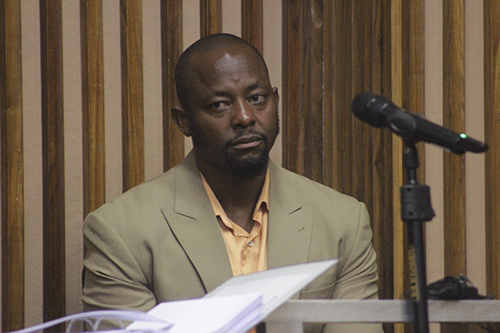Roland Routh
Judgement in the constitutional challenge lodged by disgraced former CEO of the National Fishing Corporation of Namibia (Fishcor) Mike Nghipunya will only be delivered on 29 September, three judges of the High Court announced yesterday.
After hearing about five hours of arguments and counter-arguments on the merits and demerits on the constitutionality of the words “in the interest of the public or the administration of justice” in section 61 of the Criminal Procedure Act (CPA), Windhoek High Court judges Herman January, Thomas Masuku and Esi Schimming-Chase said due to the complexity of the application and the sheer volume of documents they have to work through, the earliest they can pronounce themselves will be on or before 29 September at 10h00.
They said that due to the interest in the matter, two days will be set aside to read the full judgment.
Nghipunya wants the court to review and set aside the section in the CPA containing the words and declare it unconstitutional, null and void and of no force of law and effect.
According to him, the words unduly place an unreasonable limitation to his rights in Articles 7, 10, 11, 12, 22, 24 and 25 of the Namibian constitution.
He further argues the words exceed the limits of a constitutionally compliant law, and it is overly broad and incapable of full comprehension by those likely to be affected by it. “The aim of that section is to give the judiciary unguided and untrammelled discretion which goes beyond the scope of the Namibian constitution,” he claimed. “The aforesaid impugned provision essentially authorises pre-trial and pre-sentencing detention in circumstances which are not authorised by the Namibia constitution.” The minister of justice, the attorney general and the prosecutor general are the respondents in the matter and are represented by Advocate Slysken Makando on instructions of the government attorney. Advocate Raymond Heathcote, on behalf of Nghipunya, argued the court should scrap the whole section and declare it unconstitutional. However, he said, to avoid a situation where the courts will be overwhelmed by a flurry of bail applications in the event they are successful, the judges should order that the declarator is only operational from the date of the order and that presiding officers should in the meantime or until such time as parliament has rectified the situation follow the dictates of the late Chief Justice Ismael Mohamed in the Donald Acheson matter. In that instance, public interest was trumped by other issues such as the length an accused will remain in pre-trial detention until his trial is finalised as well as his roots in Namibia and whether or not he has assets that will be forfeited in case of abscondment. Heathcote argued the section gives presiding officers, who already determined non-abscondment and interference, a wide ambit to exercise their “options” whether or not to grant bail. He asked the court to grant their prayers and order the respondents to pay the costs of one instructing and two instructed counsels. Thabang Phatella assisted Heathcote on instructions of Milton Engelbrecht.
Makando argued no case was made out by the applicant. According to him, what is at the heart of the matter is whether it was shown by the applicant that the section is offensive to the constitution. According to him, the section cannot be invoked without a basis and only in serious offences. He further said the section actively encourages the court to enquire into the circumstances of an accused. Should an accused be released on bail without taking the interest of the public into consideration, he said, the community will call into question the administration of justice.
rrouth@nepc.com.na



